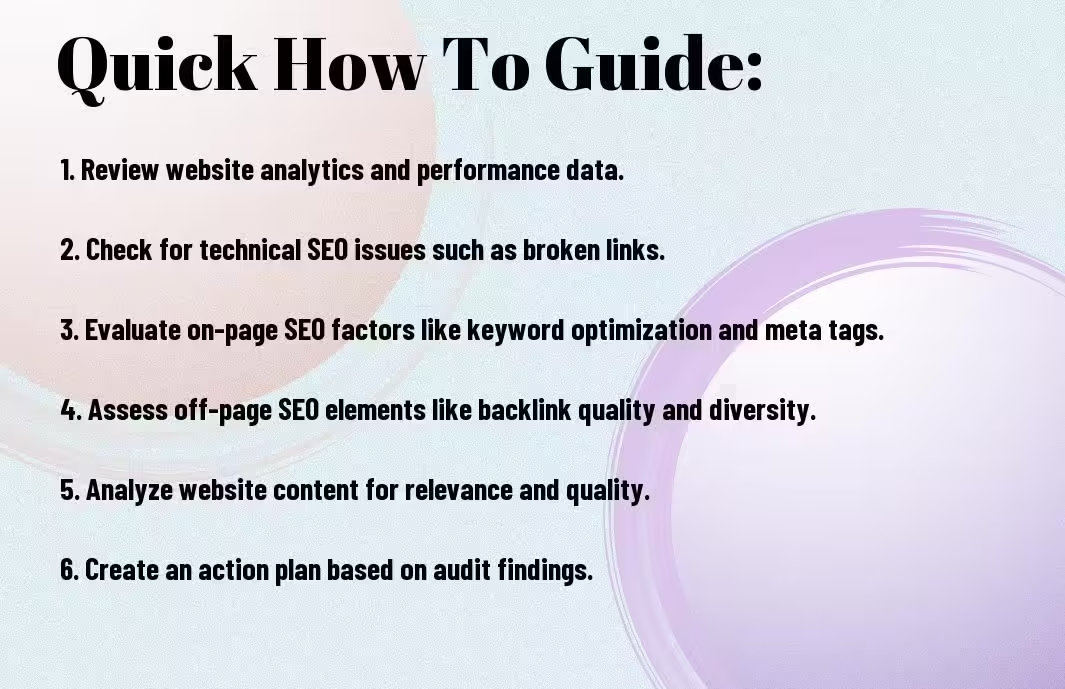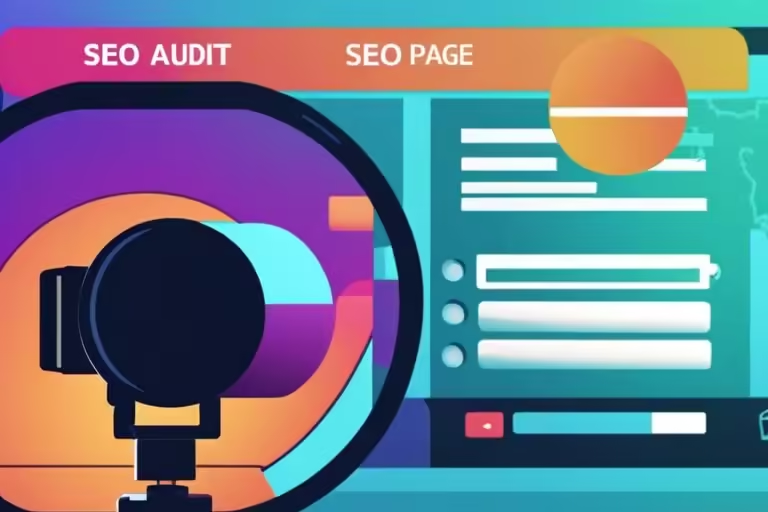Audit your website regularly to ensure optimal performance and visibility on search engines. By following a step-by-step process, you can identify critical issues, opportunities for improvement, and ultimately boost your website’s search ranking. Learn how to effectively review your site’s SEO components and make the necessary adjustments for maximum impact.
Key Takeaways:
- Keyword Research: Conduct thorough keyword research to target the right keywords for your website.
- On-Page SEO: Analyze and optimize on-page elements such as meta tags, headings, and content for better SEO performance.
- Technical SEO: Check for technical issues like broken links, site speed, and mobile responsiveness to improve website performance.
- Backlink Analysis: Evaluate the quality and quantity of backlinks pointing to your site to improve your website’s authority and search ranking.
- Content Audit: Review and update existing content, create new valuable content, and ensure it aligns with your target keywords and audience intent.


Understanding the Importance of SEO Audits
Why Regular SEO Audits Matter
Before venturing into the process of conducting a comprehensive SEO audit, it’s important to understand why regularly auditing your website is crucial for your online success. SEO audits help you identify opportunities for improvement and ensure that your website is optimized for search engines. By conducting regular audits, you can stay on top of any changes in search engine algorithms and adjust your SEO strategy accordingly. This proactive approach can help you maintain high search engine rankings and drive more organic traffic to your site.
The Consequences of Neglecting SEO Audits
Assuming you can neglect regular SEO audits without any consequences can be a costly mistake. If you don’t regularly audit your website, you run the risk of falling behind your competitors in search engine rankings. This can result in a significant loss of organic traffic and potential customers. Additionally, neglecting SEO audits can lead to technical issues on your site going unnoticed, which can negatively impact your website’s performance and user experience.
Understanding the consequences of neglecting SEO audits can help you realize the importance of staying on top of your website’s SEO health. If you ignore regular audits, you may miss out on valuable opportunities to improve your search engine visibility and drive more traffic to your site. Don’t let your competition outshine you because you failed to prioritize your SEO strategy.
Preparing for an SEO Audit
Gathering Essential Tools and Resources
Even before you begin conducting an SEO audit, it is crucial to gather all the imperative tools and resources you will need for the process. These may include tools for website analysis, keyword research, backlink analysis, and rank tracking. Some popular tools you may consider using are Google Analytics, Google Search Console, SEMrush, Ahrefs, Moz, and Screaming Frog.
Identifying Key Performance Indicators (KPIs)
Preparing to conduct an SEO audit involves identifying the Key Performance Indicators (KPIs) that will help you measure the success of your SEO efforts. These could include organic traffic, keyword rankings, backlink quality, conversion rates, and bounce rates. By understanding which KPIs are most important to your website’s performance, you can tailor your audit to focus on these metrics.
Setting Clear Objectives and Goals
For the SEO audit to be successful, it is imperative to set clear objectives and goals that you aim to achieve through the process. Define what you want to accomplish with the audit, whether it is to increase organic traffic, improve keyword rankings, enhance user experience, or boost conversion rates. By setting specific goals, you can better track your progress and measure the impact of your SEO efforts.
Analyzing Technical SEO Factors
After conducting keyword research and on-page SEO analysis, the next step in your comprehensive SEO audit is to investigate the technical aspects of your website. This involves assessing various technical SEO factors that can impact your website’s performance and visibility on search engines.
Crawl Errors and Website Accessibility
Crawl through your website to identify any crawl errors that may be hindering search engine bots from properly indexing your content. These errors could include broken links, redirected pages, or other issues that prevent search engines from accessing your site effectively. In addition, check your website’s accessibility to ensure that it is user-friendly and compliant with accessibility standards.
Recognizing and fixing crawl errors and improving website accessibility will not only help search engines better understand your content but also enhance the user experience on your site.
Page Speed and Mobile Responsiveness
There’s no denying the importance of page speed and mobile responsiveness in today’s digital landscape. A slow-loading website or one that doesn’t display properly on mobile devices can significantly impact your SEO performance. Google considers these factors when ranking websites, so it’s crucial to optimize your site for speed and mobile usability.
Technical tools can help you analyze your website’s page speed and mobile responsiveness, providing insights on areas that need improvement to enhance user experience and boost your search engine rankings.
SSL Certificates and Website Security
Errors related to SSL certificates and website security can have serious implications for your website’s SEO. Search engines prioritize secure websites, so having a valid SSL certificate and ensuring proper website security measures are in place is imperative for maintaining your search engine rankings.
The presence of SSL certificates and robust website security not only indicates trustworthiness to both search engines and users but also protects sensitive data and transactions on your site.
XML Sitemaps and Robots.txt Files
One of the key technical SEO factors to consider is the presence and proper configuration of XML sitemaps and Robots.txt files. These files help search engines navigate and index your site effectively, providing them with important information about your website’s structure and content.
Submitting XML sitemaps and optimizing Robots.txt files can improve your website’s crawlability and ensure that search engines index the most important pages on your site, ultimately enhancing your visibility in search engine result pages.
Evaluating On-Page SEO Elements
Despite the advancements in search engine algorithms, on-page SEO elements still play a crucial role in determining your website’s ranking. This is why it’s necessary to conduct a thorough audit of your on-page elements to ensure they are optimized for maximum visibility and relevance. In this chapter, we will discuss key areas to focus on when evaluating your on-page SEO.
Optimizing Title Tags and Meta Descriptions
There’s no denying the importance of title tags and meta descriptions in on-page SEO. These elements not only provide search engines with necessary information about your content but also influence user click-through rates. **Ensuring your title tags are concise, relevant, and include your target keywords can significantly impact your search ranking**. Similarly, **well-crafted meta descriptions that accurately describe your content can improve your visibility in search results**.
Header Tags and Content Structure
For an effective on-page SEO strategy, **utilizing header tags (H1, H2, H3, etc.) is crucial for organizing your content hierarchically**. **Header tags not only help search engines understand the structure of your content but also make it more readable for your audience**. Additionally, **structuring your content with proper headings and subheadings can enhance user experience and keep visitors engaged on your site**.
**Title your pages with H1 tags to signify the main topic of your content. Use H2 tags for subheadings and H3 tags for further subtopics**. This hierarchy helps search engines better comprehend the context of your content, improving your chances of ranking for relevant keywords.
Image Optimization and Alt Tags
Now, **you may not realize this, but images on your website can also be optimized for SEO**. **By using descriptive filenames and alt tags that include keywords, you can improve your chances of appearing in image search results**. Additionally, **properly optimized images can enhance the visual appeal of your website and contribute to a better overall user experience**.
**Tags like ‘alt text’ are used to describe the contents of an image to visually impaired users or in cases where the image fails to load**. **By including relevant keywords in your alt tags, you are providing search engines with more context about your images, which can improve your website’s overall SEO performance**.
Internal Linking and Anchor Text
**OnPage, internal linking is a powerful SEO strategy that can improve your website’s visibility and user experience**. **By linking relevant pages within your website using informative anchor text, you can guide users to explore more of your content and signal the importance of specific pages to search engines**. **A well-thought-out internal linking structure can help distribute link equity throughout your site and boost your rankings for key pages**.
**Text link anchors are a crucial aspect of internal linking. Use descriptive anchor text that gives users and search engines an idea of what they can expect when they click on the link**. **Avoid using generic terms like ‘click here’ and instead opt for anchor text that is relevant to the linked content**. **By optimizing your anchor text, you can provide both users and search engines with more context about the linked pages, ultimately improving your website’s SEO performance**.
Assessing Off-Page SEO Factors
Your off-page SEO factors are crucial for your website’s overall search engine optimization. These factors are external to your website and include elements such as backlinks, social media signals, online reputation, local SEO, and online reviews. Assessing these factors properly can help you understand how your website is perceived by search engines and users, and can guide you in improving your SEO strategy.
Backlink Analysis and Quality Assessment
If you want to conduct a comprehensive SEO audit, examining your backlink profile is important. Backlinks are links from external websites that point to your site, and they play a significant role in search engine rankings. You should analyze the number of backlinks, the quality of the websites linking to you, anchor text distribution, and the overall authority of your backlink profile. Knowing which backlinks are valuable and which ones are harmful can help you optimize your link-building strategy.
Social Media Signals and Online Reputation
Social media signals and online reputation are also critical off-page SEO factors. Social media signals include likes, shares, and comments on platforms like Facebook, Twitter, and Instagram. These signals can indicate the popularity and authority of your website. Your online reputation, on the other hand, involves how your brand is perceived online through reviews, mentions, and ratings. Monitoring social media signals and managing your online reputation can help you build credibility and trust with your audience.
Quality backlinks from reputable websites and a strong presence on social media platforms can significantly boost your SEO efforts. When search engines see that other trustworthy sites are linking to you and users are engaging with your content on social media, they are more likely to view your website as authoritative and relevant to users’ queries. Remember to regularly monitor and optimize these off-page SEO factors to maintain a strong online presence and improve your search engine rankings.
Identifying Keyword Opportunities and Gaps
Once again, one of the crucial steps in conducting a comprehensive SEO audit is identifying keyword opportunities and gaps. By understanding what keywords your website is currently ranking for and where there may be untapped potential, you can develop a strategy to improve your search engine visibility.
Conducting Keyword Research and Analysis
Assuming you have access to tools like Google Keyword Planner, SEMrush, or Ahrefs, you can start by conducting keyword research to identify high-volume and relevant keywords for your industry. Look for keywords that have a good balance of search volume, competition, and relevance to your business.
Identifying Long-Tail Keywords and Phrases
Identifying long-tail keywords and phrases is important for capturing more targeted traffic and improving your chances of ranking higher in search engine results. Long-tail keywords are longer, more specific phrases that are less competitive but often have higher conversion rates.
Phrases such as “best SEO audit tools for small businesses” or “how to improve website speed for better rankings” are examples of long-tail keywords that can help you attract users who are further along in the buying cycle and more likely to convert.
Analyzing Competitor Keywords and Strategies
If you want to stay competitive in the online landscape, analyzing your competitors’ keywords and strategies is crucial. By understanding what keywords your competitors are targeting and how they are ranking for them, you can gain valuable insights into potential opportunities and threats.
Understanding your competitors’ keyword strategies can help you identify gaps in your own keyword targeting and discover new keyword ideas that you may not have considered. Additionally, analyzing your competitors’ content and backlink strategies can give you a better understanding of what is working well in your industry.
Creating a Keyword Map and Content Plan
Research shows that creating a keyword map and content plan is important for optimizing your website’s structure and content around targeted keywords. By mapping out which keywords you want to target on each page of your website and planning out the content that will support those keywords, you can ensure a more strategic approach to your SEO efforts.
To wrap up
Presently, you have learned how to conduct a comprehensive SEO audit to analyze and improve your website’s performance in search engine rankings. By following the steps outlined in this guide, you can identify areas for improvement, optimize your site for better visibility, and ultimately drive more organic traffic to your website. Remember to regularly conduct SEO audits to stay ahead of the competition and ensure that your site remains optimized for search engines.
FAQ
Q: What is an SEO audit?
A: An SEO audit is a comprehensive review of a website’s performance and optimization in terms of search engine rankings, usability, and technical aspects.
Q: Why is conducting an SEO audit important?
A: Conducting an SEO audit is important because it helps identify areas for improvement, ensures that the website meets best practices for search engine ranking, and can lead to increased organic traffic and visibility.
Q: What are the key elements to include in a comprehensive SEO audit?
A: Key elements to include in a comprehensive SEO audit are on-page optimization, technical SEO factors, backlink analysis, site speed assessment, and keyword analysis.
Q: How often should I conduct an SEO audit?
A: It is recommended to conduct an SEO audit at least once a year to ensure that the website is up-to-date with current SEO trends and best practices. However, more frequent audits may be needed for larger websites or those undergoing major changes.
Q: What tools can help with conducting a comprehensive SEO audit?
A: There are various tools available such as SEMrush, Ahrefs, Moz, Google Search Console, and Screaming Frog that can assist in conducting a comprehensive SEO audit by providing insights and data on various aspects of the website’s performance. It is advisable to use a combination of these tools for a thorough analysis.







